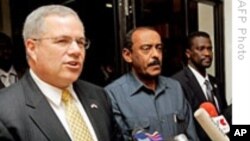Expatriate groups representing more than 1,000 Darfuris living in the United States have sent a letter asking President Barack Obama to relieve Major General (Retired) Scott Gration of his post as Sudan Special Envoy. Darfuris say the request was triggered by attacks in Darfur and the direction of policy pursued by General Gration, which they say takes a soft approach that helps Khartoum stay the course as it maneuvers to strengthen its influence over crises within its various regions.
Mohamed Suleiman of the San Francisco, California Darfur Coalition drafted the October 12 White House letter. He says that General Gration’s conciliatory approach is wrong, that Washington needs to get tougher with Khartoum, and would do better to leave the special envoy post vacant until President Omar Hassan al-Bashir feels less emboldened to continue the violence.
“Having Gration on board will give comfort to the government in Sudan, and as we see it, embolden them more and more, even in carrying out attacks in Darfur. But by not having General Gration there and having that post vacant, if the (American) reaction is harsh, I don’t think that the government of Sudan will venture in operations as were carried out just recently in the Darfur area,” he said.
During the 2008 U.S. presidential campaign, then-Senator Obama elated American anti-genocide groups by pledging to make Darfur a top foreign policy priority in his new administration. But Suleiman says that by last April shortly after the newly appointed envoy Gration made his first visit to the region, initial hopes were dashed.
Sudan President Bashir was indicted for war crimes by the International Criminal Court in early March, and retaliated by expelling 13 major humanitarian aid agencies that provided services to hundreds of thousands of homeless Darfur war victims.
From General Gration, Suleiman says Khartoum received signals that Washington had acquiesced to the readmission of only a small fraction of the groups expelled by President Bashir. The Darfur-born Suleiman says Ambassador Gration may have acted well-intentioned in sounding a conciliatory note, praising the return of four of the international aid groups, but thousands of displaced civilians in Darfur internment camps were endangered by poor services, a debilitating rainy season, and health care that was seriously deficient.
“From day one, when General Gration went to Sudan, whatever the government of Sudan was doing, it got the approval from Washington indirectly. Of course, General Gration has good intentions. But knowing the government of Sudan that committed all of those atrocities in the south and in Darfur, that is not the way to deal with a government who actually preys always on the weak and vulnerable and committed genocide in Darfur,” he said.
In the past, observes Suleiman, Sudanese officials are keenly aware of how far they can push their backing of regional warfare in Darfur and in southern Sudan before drawing reprimands from the international community. He says Darfuri expatriates living in the United States have concluded that the absence of a Sudan envoy at present would promote greater debate and allow other Obama administration voices to press for stronger opposition to Sudan government policies.
“The government of Sudan is attacking the civilians and using the same methods of bombing by Antonovs and the janjaweed are unleashed. They couldn’t have done this if there was a harsher response from Washington, D.C., even just rhetoric. So we reached the conclusion that having this post filled by General Gration is kind of encouragement to the government of Sudan to just go on with the atrocities on our people. Having the post vacant is more a deterrent to the government of Sudan than having General Gration on the post,” he said.
As Sudan faces national elections next year and a critical test of national unity with an upcoming referendum on self-determination for the semi-autonomous southern part of the country, Washington believes that the role of a Sudan Special Envoy is essential in preventing the breakup of Africa’s largest country. Mohamed Suleiman says the Darfur coalition has not yet received a reply to its request for Ambassador Gration to leave his post.




